182 Search Results for rett
May 6, 2019
by Carole Zangari -
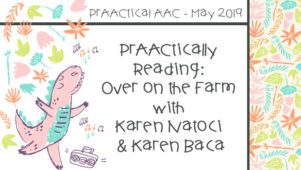
Are you ready for some reading, AAC style? In today’s edition of PrAACtically Reading, Karen Natoci and Karen Baca share a preschool book about farm animals. Karen Natoci is an AAC Supervisor who is well-known to the readers of this site (see her wonderful contributions here.). Her colleague Karen Baca is an AT and AAC Specialist with over 30 years in the field of AT, specializing in AAC, alternative access, and literacy for all students with disabilities. They both work for The Speech Pathology Group in the San Francisco Bay area. Book: Over on the Farm by Marianne Berkes and illustrated by Cathy Morrison (Copyright © 2003, Little, Brown and Company; Hachette Book Group, www.lb-kids.com) Vocabulary focus: All core words Fringe Vocabulary focus: horse/foals/neigh, cat/kittens/meow, cow/calves/moo, goat/kids/maa, chicken/chick/cheep-cheep, owl/owlets/hoot-hoot, mouse/pups/squeek, turkey/poults/gobble-gobble, duck/ducklings/quack, pig/piglets/oink Actions: peck, nibble, swish, wash, gallop, hide, fly, strut, waddle roll Communication Matrix (Rowland, 2009) level: I-VIII... [Read More...]
February 25, 2019
by Carole Zangari -
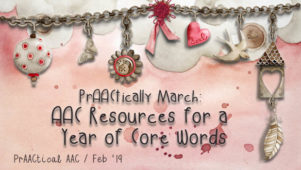
Do the AAC users in your life use only a fraction of the core words in their SGD, AAC app, or communication board? One way to help them move forward is to make a concerted effort to use, highlight, and provide additional teaching on a variety of words. It’s hard to do this without getting overwhelmed, so find a strategy that works for you. A few years ago, we decided to approach this by focusing on 12-16 core words each month. (If this is too much for the teams with whom you work, that’s not a problem. Just cut it back to 4-6 words/month.) Each month, we can highlight those words in our conversation (aided language input), direct intervention, and home programming activities with AAC learners. The repeated experiences with those 12-16 (or 4-6) words helps our AAC learners develop new skills, and keeps the team focused on the same destination. It’s... [Read More...]
January 24, 2019
by Carole Zangari -
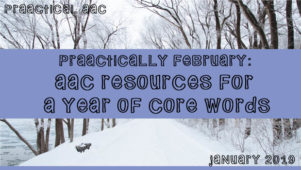
As we prepare to bid January a fond farewell, we’re looking ahead to ways we can highlight more of the core vocabulary words in our clients’ AAC devices and communication aids. One approach to boosting practice opportunities is to select a dozen or so core words to focus on each month. Throughout the month, we can then pay special attention to that small group of words by highlighting them with focused language stimulation, aided language input, and specific activities designed to teach or practice those words. In previous years, we shared lists of some core words to help you do just that and every month we share some ideas for prioritizing a small set of words. You can use these materials to remind yourself which words to highlight this month, with using aided language input and focused language stimulation. What else? Here are some ideas to get you started. Print them... [Read More...]
January 3, 2019
by Carole Zangari -
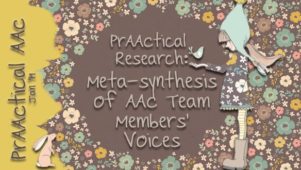
We are delighted to start off the New Year by welcoming back Dr. Kathy Howery for another wonderful review of an AAC research article. Dr. Howery has worked in the field of assistive technology and special education for over three decades. Her research uses phenomenological methods to seek understanding of the lived experience of speaking with/through a speech-generating device. She is currently on contract with the Ministry of Education low incidence team, and as a consultant to schools and school districts across Alberta focusing primarily on children and youth with complex communication needs. In today’s post, she discusses a research study that sheds light on the ways that we can better support students with AAC needs. :::::::::::::::::::::::::::::::::::::::::::::::::::::::::::::::::::::::::::::::::::::::::::::::::::::::::::::::::::::::::::::::: Chung, Y-C. & Stoner, J. B. (2016). A meta-synthesis of team members’ voices: what we need and what we do to support students who use AAC. Augmentative and Alternative Communication, 32 (3), 175-186.... [Read More...]
December 27, 2018
by Carole Zangari -
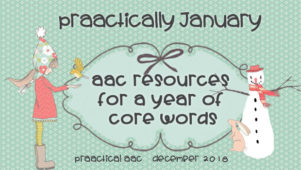
As we prepare to take down our 2018 calendars, we’re looking ahead to January and gearing up to model and teach some more core words to our AAC learners. If you have some prep time this week, join us! This is a great time to get the word cards and other materials for the Year of Words (Set 1; Set 2) ready to use with the AAC learners in our lives. Thanks to the generous spirit of PrAACtical AAC readers we have posts with a variety of resources: Templates for you to plug in your own symbols: Set 1 words, Set 2 words Minspeak/Unity version: Set 1 PCS versions: Set 1, Set 2 Speak for Yourself version: Set 2 SymbolStix version: Set 1 Lesson Pix: Set 1 Smarty Symbols: Set 1 words, Set 2 words CoughDrop: Set 1 words; Set 2 words WordPower: Set 1 words (Note: This is a large file that contains... [Read More...]
December 3, 2018
by Carole Zangari -
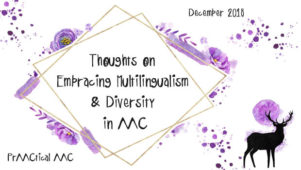
How can we best support learners with complex communication needs who come from a variety of cultural and linguistic backgrounds? Today, we turn the reins over to Arizona-based SLP Deanna Wagner who shares her thoughts on embracing and encouraging multilingualism and diversity in our AAC work. ::::::::::::::::::::::::::::::::::::::::::::::::::::::::::::::::::::::::::::::::::::::::::::::::::::::::::::::::::::::::::::::::::::::::::::::: My latest article on cultural diversity has just been published in the ASHA Special Issue on Cultural and Linguistic Diversity and AAC, guest edited by Gloria Soto! That means that ASHA members who have a Special Interest Group affiliation can access it and receive CEU credit for studying the content and answering a few questions. Since not all readers are members of an ASHA SIG, I would like to take a moment to share my experiences in preparing the manuscript that I submitted for this article. Most importantly, as people who serve the needs of those who benefit from AAC, we all need... [Read More...]
October 18, 2018
by Carole Zangari -
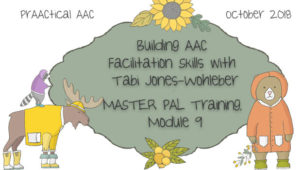
We continue our AAC partner training series, authored by SLP Tabi Jones-Wohleber, with a 60-minute session on presuming potential. In addition to her work with the AT Team for Frederick County Public Schools in Maryland, Tabi serves young children and their families at West Virginia Birth to Three programs. You can see the first 8 modules here. ::::::::::::::::::::::::::::::::::::::::::::::::::::::::::::::::::::::::::::::::::::::::::::::::::::: Model as a MASTER PAL Module 9: Presume Potential Presuming potential is a belief system that influences our words and actions both consciously and unconsciously. As such it cannot be overstated that our words and actions shape the nature and trajectory of opportunities for learning, communicating and engaging for those with whom we interact who use AAC. This module showcases a parent perspective, and utilizes many video examples to invite participants into an honest and reflective conversation on the need to shed assumptions about where an individual’s learning will “max out”. It... [Read More...]
September 24, 2018
by Carole Zangari -
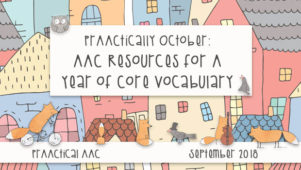
Know any AAC learners like these? Jeremiah has an SGD with thousands of core and fringe words, but he uses less than 100 of them in day-to-day life. Bella used an AAC app with visual scene displays to interact at playtime and during daily routines for the past several months. Her team just added an app with a grid-based vocabulary so that she can begin to create novel sentences and expand her language abilities. Mason was recently evaluated for an AAC device, but it will likely take a few months to get the funding situation straightened out. In the meantime, his team created a manual communication board that mirrors the main screen of the SGD’s language software. Each of them needs lots of practice to become fluent with the core words in their AAC systems. Are you looking for resources to support your use of core words in therapy, in... [Read More...]
September 10, 2018
by Carole Zangari -
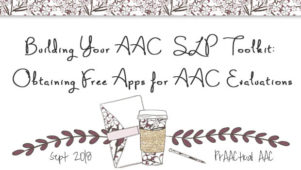
A carpenter without a hammer? A painter without a brush? A surgeon without a scalpel? No matter how skilled these professionals are, they can’t do their work without the tools necessary for the job. SLPs need their tools, too. Sometimes those tools are tangible items, like formal tests, mirrors, computers, and penlights. And sometimes those tools are less tangible, like software, digital subscriptions, and apps. Most service delivery settings where AAC evaluations take place (e.g., clinics, schools, hospitals), though, fail to provide SLPs with the adequate range of AAC tools they need to do their jobs well. And, as any practicing SLP knows, the budget for materials ranges from minimal to non-existent. So, what’s a clinician to do? Savvy SLPs have a variety of strategies for getting the resources they need. It’s disheartening that they need to even do this, but, for many, the reality is that either the SLPs... [Read More...]
July 12, 2018
by Carole Zangari -
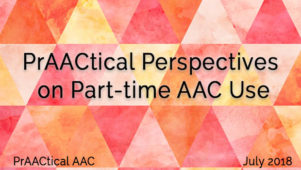
Can AAC be of benefit to people who speak? Today, we welcome Alyssa Hillary Zisk, an Autistic PhD student in the Interdisciplinary Neuroscience Program at the University of Rhode Island, who shares their experiences with part-time AAC use. :::::::::::::::::::::::::::::::::::::::::::::::::::::::::::: Think about a person who uses AAC. I’m probably not the person you thought of. For one thing, I’m an autistic adult, and the AAC research I’ve seen relating to autism is generally about kids. Services are generally aimed at kids too. For another, my AAC use isn’t the result of having consulted with a specialist who evaluated me and suggested possible strategies. Oh, and my speech sounds pretty fluent, in two languages — when I can talk. That’s not always, and there is the reason I use AAC. I’ve always had somewhat intermittent speech – that is, I can talk, but only sometimes. For this reason, I use a variety of... [Read More...]









